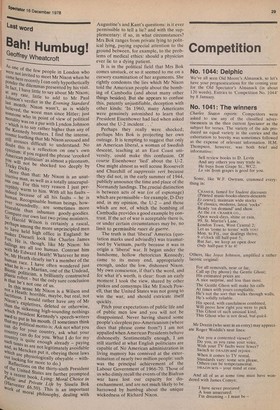Bah! Humbug!
Geoffrey Wheat ft As one of the few people in London who were not invited to meet Mr Nixon when he came her recently I can only hypothetically Ponder the dilemmas presented by his visit. lb fact, I have little to say about Mr Nixon; at any rate, little to add to Mr Paul Johnson's verdict in the Evening Standard last month: Nixon wasn't, as is widely believed, the worst man since Hitler; just someone who in point of view of political Morality was on a par with Lyndon Johnson Which is to say rather higher than any of the Kennedy brothers. I find the intense, cosmic loathing that Mr Nixon aroused and Still arouses difficult to understand. No doubt this is a reflection on one's own cYnicism: if you regard the phrase 'crooked American politician' as almost a pleonasm, You Will not be shocked too deeply by Tricky Dicky. More than that: Mr Nixon is an unat'ractive man, as well as a totally unscrupulous one. For this very reason I just per k. ptibly warm to him. With all his faults indeed because of all his faults he is bunion. Recognisable human beings, howeVer scoundrelly, are sometimes more bearable than inhuman goody-goodies. t.Compare our own last two Prime ministers. Harold Wilson is certainly a rascal, PerhaPs among the more unprincipled men ;to have held high office in England: he flakes Disraeli look like Charles James f He is, though, like Mr Nixon: his 'ailings are all too human. Contrast him With Mr Edward Heath! Whatever he may ‘he, Mr Heath clearly isn't a member of the ;naurnan race. I have often wondered just al he is a Martian, one of the Undead, 10l10nic politician, a brilliantly constructed Plastic robot but the only sure conclusion is that he's not one of us. In this sense Mr Nixon is a Wilson and ri.,ot a Heath: horrible, maybe, but real, not 1Nactitious. I would rather have any of Mr „ nt°11's expletives, deleted or otherwise, than the sickening high-sounding nothings Which President Kennedy's speech-writers used to put in his mouth. (I sometimes think that MY Political motto is: Ask not what you ean do for your country, ask what your e°1111trY can do for you. What I do for my country is quite enough already Paying nsuch taxes as are not legitimately avoidable t!, as Mencken put it, obeying those laws Which are physiologically obeyable without 1°{1king for more to do.) Of on the thirty-sixth President Of the United States are further prompted by a recent book, Lying: Moral Choice in Pisbije and Private Life by Sissela Bok Irtarvester £6.50). This is an important work of moral philosophy, dealing with Augustine's and Kant's questions: is it ever permissible to tell a lie? and with the supplementary: if so, in what circumstances? Mrs Bok ranges from private lying to political lying, paying especial attention to the ground between, for example, to the problems of medical ethics: should a physician ever lie to a dying patient.
It is in the political field that Mrs Bok comes unstuck, or so it seemed to me on a cursory examination of her arguments. She rightly condemns the lies which Mr Nixon told the American people about the bombing of Cambodia (and about many other things besides). But she appears to confuse this, patently unjustifiable, deception with other kinds: 'In 1960, many Americans were genuinely astonished to learn that President Eisenhower had lied when asked about the U-2 incident. .
Perhaps they really were shocked; perhaps Mrs Bok is projecting her own outrage. It is tempting to suggest that only an American liberal, a woman of Swedish descent, teaching at an East Coast university, could make this confusion. Of course Eisenhower 'lied' about the U-2. One might almost as well accuse Roosevelt and Churchill of suppressio veri because they did not, in the early summer of 1944, publicly announce the time and place of the Normandy landings. The,crucial distinction is between acts of war (or of espionage) which are permissible for example, D-Day and, in my opinion, the U-2 and those which are not, of which the bombing of Cambodia provides a good example by contrast. If the act of war is acceptable there is, or under certain circumstances may be, no limit to permissible ruses de guerre.
The truth is that 'liberal' America (quotation marks used advisedly) was traumatised by Vietnam, partly because it was in origin a 'liberal' war. It began under the handsome, hollow rhetorician Kennedy; came to its messy end, appropriately enough, under the low, dishonest Nixon. My own conscience, if that's the word, and for what it's worth, is clear: from an early moment I took the view, shared by other pinkos and comsymps like Mr Enoch Powell, that the United States was not going to win the war, and should extricate itself quickly.
Pitch your expectations of public life and of public men low and you will not be disappointed. Never having shared some people's sleepless pro-Americanism (where does that phrase come from?) I am not appalled when American Presidents behave dishonestly. Sentimentally enough, I am still startled at what English politicians are capable of. No American administration in living memory has connived at the extermination of nearly two million people: such was the principal achievement of the Labour Government of 1966-70. Those of us who dimly recall the events of the Biafran war have lost our capacity for disenchantment, and are not much likely to be harrowed by humbug about the unique wickedness of Richard Nixon.


































 Previous page
Previous page